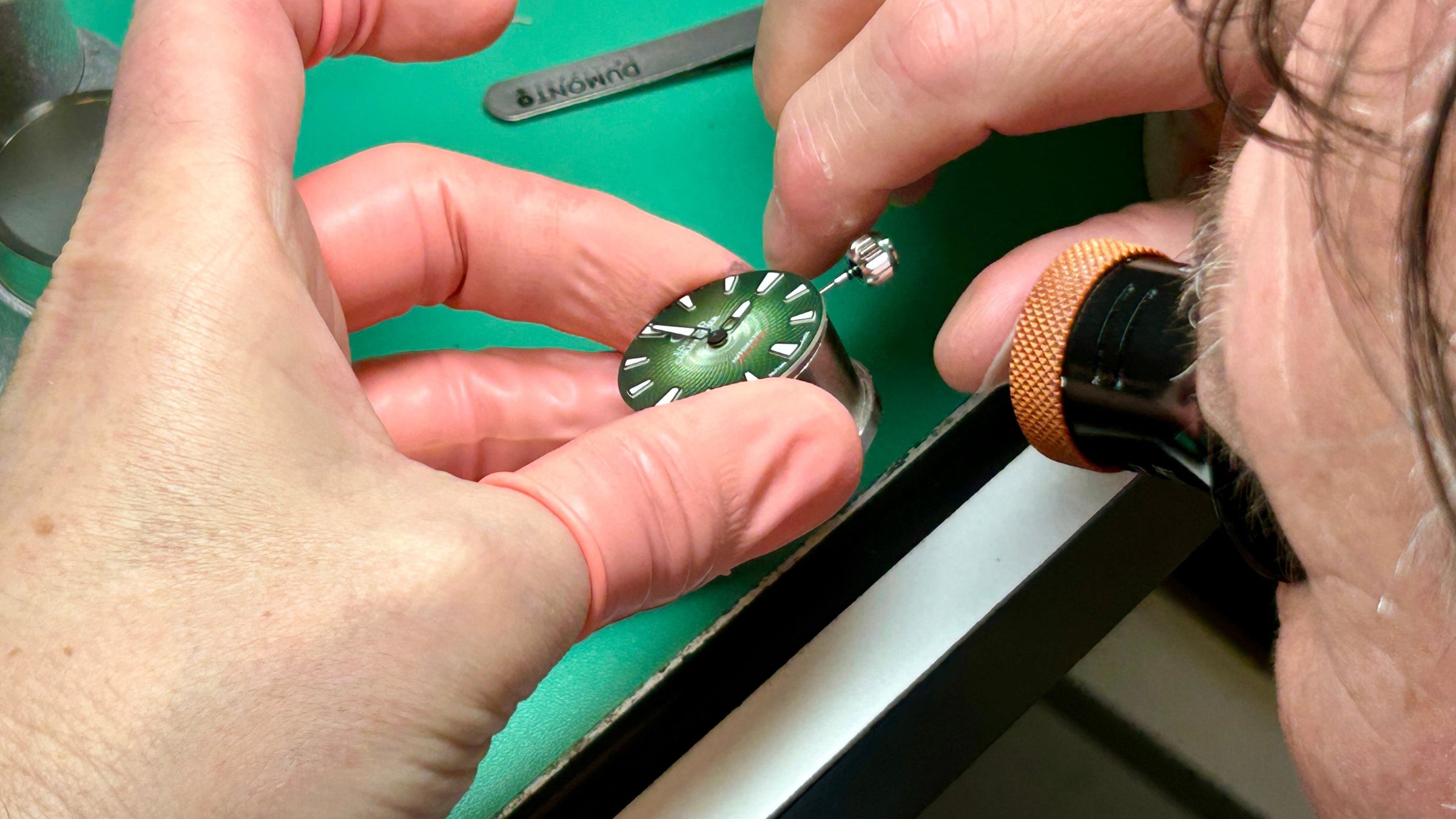
Caring For & Maintaining Your Watch
Even though there are specific instructions for each watch we design and produce for you...
Below are some helpful watch care & maintenance tips to help you keep your Edward Christopher watch in the best condition so you can enjoy it for even longer.
Care & Maintenance
Power Reserve
Your watch is powered by a top quality Swiss automatic movement which means that, when you move your wrist, it generates momentum which, in turn, generates the charge to power the watch.
So if, for instance, your watch has a power reserve of 38 hours, then as long as you move your watch at least once every 38 hours, then it’ll tell you the (accurate) time. So, what’s not to like!
Water Resistance
A watch with a water resistance rating means the following...
It's your watch is water resistant to a depth of 200m/660ft (20 ATM), then that's your limit. So, a water resistance rating like this means it's suitable for recreational scuba diving.
Recreational divers don’t tend to go deeper than 40m/130ft, anyway. Beyond that, you enter the realm of technical diving, which requires extensive training, special mixed gases to breathe, long decompression stops and special equipment.
And please bear in mind that a watch’s water resistance can’t be guaranteed permanently.
Various factors can affect the water resistance of your watch over time: for instance, from ageing parts, like
gaskets, to crowns and/or pushers being accidentally knocked out of line or used when under water.
Water Leak Prevention
Make sure the crowns are screwed down or pushed in properly before the watch goes into any water. And don’t operate a crown or pusher when under water.
Otherwise, as I’m sure you can imagine, water could get inside…and…how shall we put this…would spoil things.
Shock Resistance
Your watch is shock resistant when it comes to minor impacts. But, dropping it from an unhelpful height onto a hard surface may damage the movement, as well as the watch itself. And, although we can replace your movement and repair your watch, it would be costly. Just saying.
Salt Water & Chlorine
Scuba diving and swimming in salt water can cause corrosion to the case if your watch isn’t rinsed under fresh water after being exposed.
The same applies when you’ve been swimming in a chlorinated pool. If you do think your watch has been exposed to moisture and the crystal appears foggy, take it to a service professional as soon as possible.
Everyday Chemicals
It is strongly advisable not to shower with your watch on. Shampoo, soaps, cosmetics and perfumes can damage your watch and straps.
So, if applying creams or perfumes, wait until they’re fully dry before wearing your watch. In addition, other household liquids can be corrosive to a watch's delicate components and can therefore wear it out much sooner.
And, if you accidentally expose your watch to such chemicals, rinse it off with fresh water and dry it.
Also, prolonged exposure to direct sunlight can cause your watch and its strap to fade.
Magnetism
Magnetism can cause – albeit not that often, in reality – the spirals of the hairspring of your watch to magnetise together, shortening the spring. This can affect the movement’s ability to keep time as accurately as it would do otherwise.
So, to help prevent this happening, please try to keep your watch away from magnets (television, speakers, tablets, etc.) to prevent magnetic interference with your watch. Not always easy, we know. But, if it does happen, you’ll now understand why.
And, if your watch does become magnetised, then you take it to a watch specialist who will put it on a demagnetising machine to get it back to normal.
Temperature Range
Your watch houses mechanical movements that use oils that allow the watch to operate at temperatures between about 0C - 60C. Anything outside this range might cause issues.
And please also keep in mind that a sudden transition from, for instance, a 40C hot tub to a 7C - 12C cold plunge pool can cause a contraction of the watch’s rubber seals which could allow water to leak in.
If such drastic changes in temperature exposure happen repeatedly over time then your watch could be exposed to moisture damage.
Activity Risks
Shocks and jolts can cause watch mechanics to fall out of sync, which eventually leads to inaccuracy.
Sports that involve extreme jolts and centrifugal force, such as tennis or golf, can be particularly challenging for mechanical movements. The same goes for cycling on uneven surfaces or taking a tumble on the ski slopes.
That said, it depends on what your particular watch is designed for. Please check with us if you’re not sure.
Cleaning
Your Edward Christopher watch comes with a special watch cloth to keep it clean and smudge free. You can also run it under fresh cold water (with the crowns closed and pushers un pushed).
And never use soap or other chemicals as this could damage the surface and even the workings of your watch.
Servicing
We recommend a water-resistance check every 18 months as the best way to guarantee the water resistance of your watch…and a complete service every 4-5 years to ensure the timekeeping of your watch remains reliable.
During the service, the mechanical parts of the movement that need replacing due to wear will be included in the service cost. A new crown will be fitted free of charge. And, depending on which model you own, the price also includes polishing or brushing the case.



